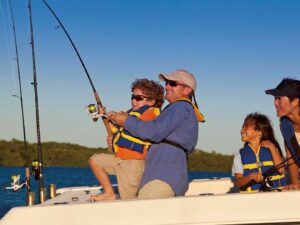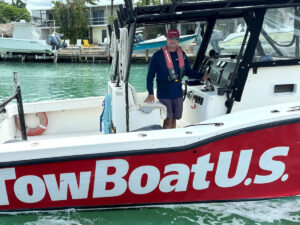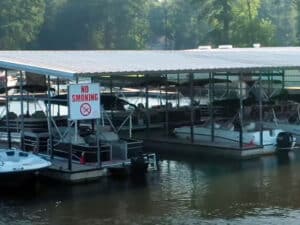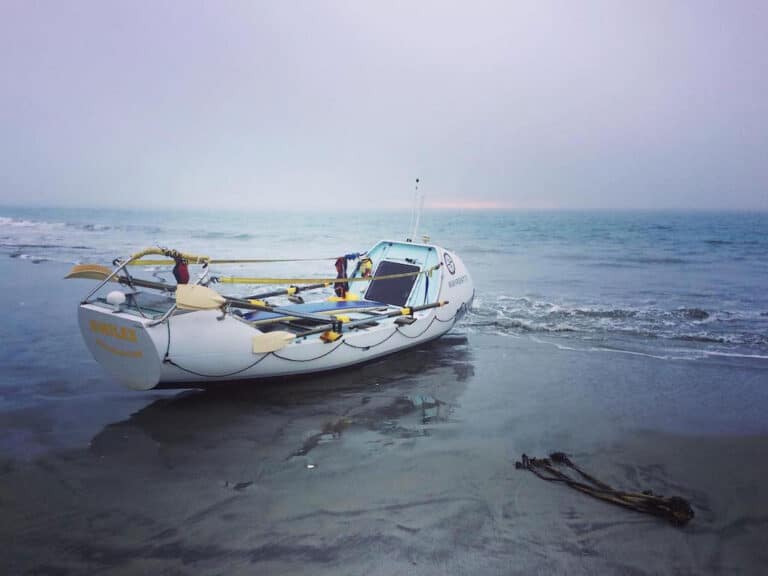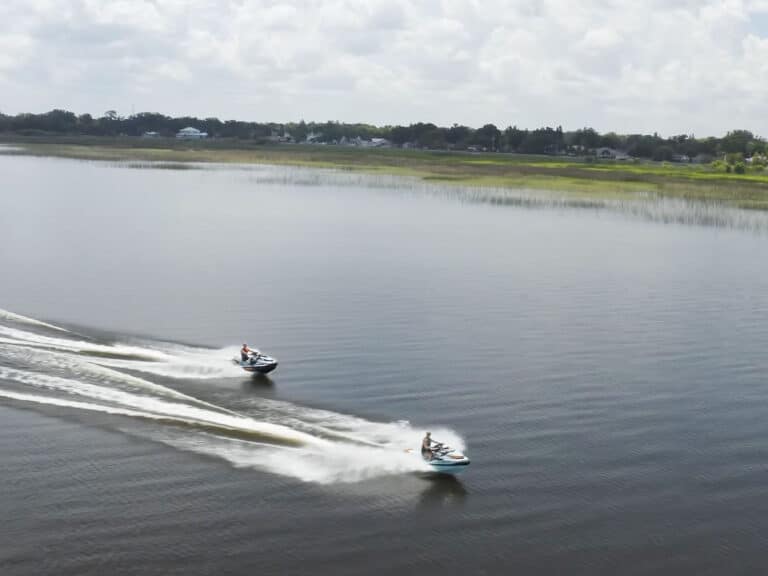
They say that for all good things there is a season. When it comes to boating, the length of that season depends on where we live—year-round in warmer climates, or just a few precious months in northern states.
Fortunately, all of us can live the boating lifestyle all year, even if our on-water season has to fit between ice-out in May, and freeze-up in November.
These days it’s easy to improve your boating skills and knowledge even when you’re not on the water. It turns out a computer terminal is a fair substitute for your boat’s console, at least when the alternative is ice fishing.
Many nationally recognized boating courses are just a few keystrokes away. They let you dive deeper into boating now, and safely enjoy being on the water later.
Emergency procedures, navigational skills and safety regulations can be learned and practiced year-round, both online or in traditional classrooms. And when you take those skills to the water—standing at the helm with the confidence to handle whatever challenges may come your way—that’s a heady thrill.
Need one more nudge? Your boat insurance carrier may give you a discount if you complete a boating-safety course approved by the National Association of State Boating Law Administrators and recognized by the US Coast Guard.
The Coast Guard, US Coast Guard Auxiliary, US Power Squadrons, and NASBLA are among agencies and groups that can guide you to, or even provide, courses offered by them or commercial providers. Another good bet is your state’s boating-safety agency.
Basics
New or newish to boating? Popular basic courses provide a solid base of knowledge and skills. One great resource is the U.S. Coast Guard Auxiliary, which offers virtual and classroom instruction to boaters of all levels. You’ll find courses covering everything from basic boating safety to specialized instruction catering to hunters, anglers, paddlers and sailors. They’re all listed on the U.S. Coast Guard Auxiliary website, including a zip-code finder that instantly pulls up courses near you. An all-day Boat America classroom session runs about $60 in most places, and some insurance companies offer discounts to boaters who successfully complete the course.
The Boat U.S. Foundation is another fantastic source for boater education. The nonprofit offers free online courses, provides links to classroom courses in your area, and can set you up with on-water training. The Boat U.S. free online safety course is available in multiple versions tailored to individual state laws and regulations. In all its versions, the course has six lessons, each with a 10-question quiz at the end, plus a final exam. The course typically takes four to eight hours to complete on your own schedule, and is almost certain to improve your boating knowledge.
You’ll learn about required and recommended safety equipment; proper boat operation; dock lines and ropes (including the fascinating world of knots and their uses); weather and tides; boarding, loading and trimming a boat; and more. There are even special sections on operating personal watercraft.
Sound intimidating? On the contrary, it dramatically reduces those awkward uncertain moments we all hate.
Part of the training is how to share the waterways with others. Boating doesn’t provide conventional highway-style lane markers and traffic signals, but there are established rules for moving across the water smoothly, even in heavy boat traffic. Maybe most important, a basic boating course covers responsible operation, including always wearing a life jacket, avoiding operating a boat under the influence of drugs or alcohol, and matching speeds to waterway and traffic conditions.
Who, What, Where?
If your next boating adventure will take you across state or national borders, you’ll want to know the boater education requirements of your destination.
While planning a recent fishing vacation in Ontario, I learned that I would need to complete a boating-safety course before I could legally operate any boat in the Canadian province. But since I was born before July 1996, my home state of Michigan had never required one of me.
Just before the Canada trip, I was due to test drive a boat in Indiana. A quick survey of that state’s rules showed that anyone without an Indiana driver’s license needed to have a boat-safety certificate to be lake-legal there.
Saving grace? Both Indiana and Ontario accept approved boater courses from other states and provinces. Before long, I was working my way through Indiana’s NASBLA-based course. When I finished, I could legally operate a boat in Indiana, Ontario and dozens of other jurisdictions.
And here’s the kicker: I learned several new things about boating, and refreshed some other knowledge that had become foggy. It was a great investment of a few hours and a couple of twenties.
Nearly all U.S. states and territories require boating licenses or safety-course certificates. In some cases the law applies to everyone, while in many jurisdictions it applies to boaters under a certain age. These age limits don’t always apply to youngsters, either – in Maryland anyone under 50 needs their boating card, and there are a dozen other states where you won’t be grandfathered out unless you’re already old enough to be a grandparent. (The American Boating Association maintains a handy list of license requirements in every U.S. state and territory).
Get Out There
Online courses and classroom sessions are great ways to learn about boating, but when it comes to mastering essential skills nothing beats hands-on practice under the watchful eye of a U.S. Coast Guard-licensed captain. The Boat U.S. On-Water Training Program is a great option for brand new boaters, as well as experienced captains looking to enhance their skills and understanding of boating safety. Plus, it’s fun. Who’s going to say no to a day on the water with like-minded boaters? A typical outing runs about three hours with a licensed instructor and three or four students. The cost varies depending on when you book, where you live and what course you take, but typically ranges from $149 to $199. Find a training center location near you here.
Additional Boating Safety Resources
American Boat Operators’ Course
Offers online boating safety courses with online certification tests for a number of states.
American Canoe Association
Comprehensive resource to find skills courses, assessments, and instructor certification courses for kayak, canoe, raft, safety & rescue, and adaptive paddling.
BoatEd
Offers online boating safety courses with online certification tests for a number of states.
BoaterExam.com
Offers online boating safety courses with online certification tests for a number of states.
Boatsafe
Offers an online Basic Boating Certification Course approved by the National Association of State Boating Law Administrators, and a Coastal Navigation Course.
Commander Bob
An award-winning website that advances boating education.
PWC Safety School
Offers online courses and certification for PWC operators in several states.
Safe Boating America
Safe Boating America classes meet the State Educational Requirements for operating a Boat or PWC and also meet the requirements for a Youth Operator.
State Courses
Many states offer boating safety courses. The National Association of State Boating Law Administrators’ online Directory provides contact information for state boating agencies.
United States Power Squadron
“America’s Boating Course 3rd Edition” the most comprehensive boating safety course available. It includes a course book, a narrated student CD and a digital charting DVD and is available as a classroom, home study or online course.
U.S. Coast Guard Auxiliary
Local flotillas offer a variety of safety classes, including basic/introductory boating courses and safety courses, navigation, sailing and personal watercraft safety, among others.
U.S. Sailing
Programs offer instruction in small and large sailboats, windsurfers, and powerboats. All levels of instruction are available around the country for beginner to advanced skills.
The U.S. Coast Guard is asking all boat owners and operators to help reduce fatalities, injuries, property damage, and associated healthcare costs related to recreational boating accidents by taking personal responsibility for their own safety and the safety of their passengers. Essential steps include: wearing a life jacket at all times and requiring passengers to do the same; never boating under the influence (BUI); successfully completing a boating safety course; and getting a Vessel Safety Check (VSC) annually from local U.S. Coast Guard Auxiliary, United States Power Squadrons®, or your state boating agency’s Vessel Examiners. The U.S. Coast Guard reminds all boaters to “Boat Responsibly!” For more tips on boating safety, visit www.uscgboating.org.

